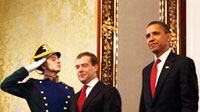
I’ll never forget how jazzed my Moscow friends were last March, on the eve of Russia’s presidential election, excitedly blogging about and poring over the latest polls—from the Texas and Ohio primaries. The candidacy of Barack Obama was infinitely more interesting than the coronation of Dmitry Medvedev, forced upon a yawning populace as a fait accompli (the Kremlin candidate couldn’t even bother debating his opponents) and ushered in with obvious and unnecessary poll fraud. A year later, the near-total Russian indifference to Obama’s first presidential visit to the country is a curious and upsetting thing to witness.
Barack Obama occupies in the mind of a Westernized Muscovite a place somewhere between the iPhone and Scarlett Johansson: a nifty little thing it would be nice but impossible to claim as our own.
Sure, on the surface, the two-and-a-half-day trip will end up looking like most of Obama’s foreign visits to date. There will be a couple of photos where he clearly and cruelly outclasses his local counterpart (Medvedev, who’s 5-foot-4 and looks like a balding bobblehead doll, is an especially easy mark); a snapshot of Obama looking pinched and pensive near a sad monument (here, the Tomb of the Unknown Soldier); and some actual policy progress (on a new arms-control treaty as well some Afghanistan logistics).
Yet there’s a major difference, too. Obama is entering a rare land where he is neither despised nor loved, a mind-zone so acclimated to backroom collusion and puppet rulers that it can’t muster much enthusiasm or hatred for anything having to do with politics foreign or domestic. The fact that the U.S.-Russian relations are currently strained has little to do with it. Most Russians simply can’t bring themselves to believe that Obama matters. After all, they have a great example to the contrary in Medvedev.
Owing in part to this national plague of cynicism served up as savvy, Obamamania in Russia has never progressed beyond the hipster set concentrated in central Moscow—or, to be more specific, among the readership of smart homegrown glossies the Afisha publishing house puts out. Barack Obama occupies in the mind of a Westernized Muscovite a place somewhere between the iPhone and Scarlett Johansson: a nifty little thing it would be nice but impossible to claim as our own.
As a result, it is the highbrow and the opposition media that are rolling out the pomp-and-circumstance welcome wagon while the mainstream news phones it in. The liberal Ren-TV network ran a story on soldiers perfecting their drill in preparation for the big day—exactly the kind of item a puffed-up state channel would, but didn’t, run. Bolshoi Gorod, an inventive biweekly that’s half Spy and half The Nation, ran a multi-page “ Obama’s Guide to Moscow” pointing out places of the president’s potential interest: a comic-book store, an American diner, a prison ward where “we keep our overly active entrepreneurs.”
Obama’s decision to meet with nominal opposition leader Garry Kasparov and grant an interview to the liberal newspaper Novaya Gazeta, that of four slain reporters, helps complete the circle: In the eyes of most Russians, the opposition is clubby, tired, and utterly irrelevant, and having Obama address it diminishes his relevance in turn. Worse yet, it may leave the president with an impression that this Potemkin village of an opposition, which lives and dies by the Kremlin decree, is the real thing.
Much more effective is the gambit Obama seems to be running in his recent harsh words for Vladimir Putin intercut with praise for Medvedev's talk of court reform. Not only is a focus on courts generally a great idea (Russia has all the right laws to function like a first-world democracy; they just happen to dead-end into an almost completely corrupt judiciary apparatus), it is also an area of governance that Medvedev has increasingly been staking out as his own Putin-free territory. Obama is essentially endorsing a Putin-Medvedev power split, wherein lies a hope for further liberalization. Even if the split is unfeasible, mere talk of it is guaranteed to flatter Medvedev and piss off Putin, thus making the split a tiny bit less unfeasible. This, sadly, is the kind of Jacobean-comedy language Russia is most comfortable speaking right now.
Of course, there’s one other thing that can make the average Russian—less loyal to Putin or his protégé than willfully deaf to everything those bastards are doing up above—sit up and take notice. And it’s the same thing that has gotten Obama out of every other jam so far: a good speech. A speech filled with enough specifics (at this point in history, the Russians are rightfully allergic to big words like change) to resonate beyond the Afisha set. A speech filled with Obama’s trademark smashing of dichotomies: one that doesn’t suck up to the audience yet pays it the courtesy of respect beyond a decorative quote from Anna Akhmatova. That cedes no ground on Ukraine and Georgia, for instance, but also shows an understanding that every Russian over the age of 25 feels a knee-jerk suspicion at the word “NATO” and acknowledges (this should be easy) that Georgian President Mikheil Saakashvili can be a handful, too.
What needs to be reset, to use the word the administration has been flogging, is not the U.S.-Russian relationship, but Russia’s dour obsession with its own martyrdom that it projects on the rest of the world. Here’s hoping Obama’s got better advisers than whoever gave Hillary Clinton that red button.
Michael Idov is a contributing editor at New York magazine and has covered Russia for The New Republic. His debut novel, Ground Up, will be published later this month.






